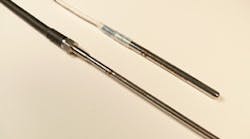Autoclaves, sterilizers and freezersthey are the lions and tigers and bears oh, my! of thermocouple applications. They are among the harshest, nastiest environments into which you can put a temperature probe. One of the perennial problems in measuring in these tough environments is moisture ingress that results in low insulation resistance and sensor failure.
The solution for the severe load probe application, Cheatham continued, was to go to a unique material impervious to moisture. We chose a proprietary material that not only withstands moisture, but also meets USP Class VI requirements for use in sanitary environments. The result was the new Weed Instrument model 3312B.
The new material also withstands the typical physical abuse seen in loading and unloading large sterilizers. The material has low memory and, thus, resists kinking.
Model 3312B comes in a variety of both sheath and lead-wire jacket diameters. It is also available in a sharp-pointed version for easy insertion into rubber capped vials, small bottles in tray washers and sterile bags. It does not sacrifice time response, assuring assure quick, accurate temperature measurement without delay or inaccurate readings.
For more information, please contact Joe Cheatham 512-434-2900, x2880, or [email protected].




